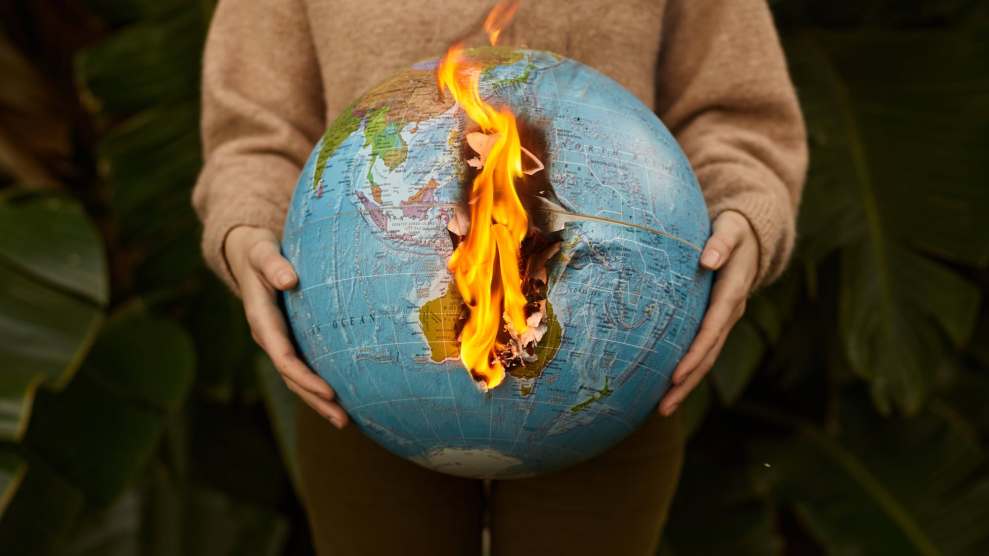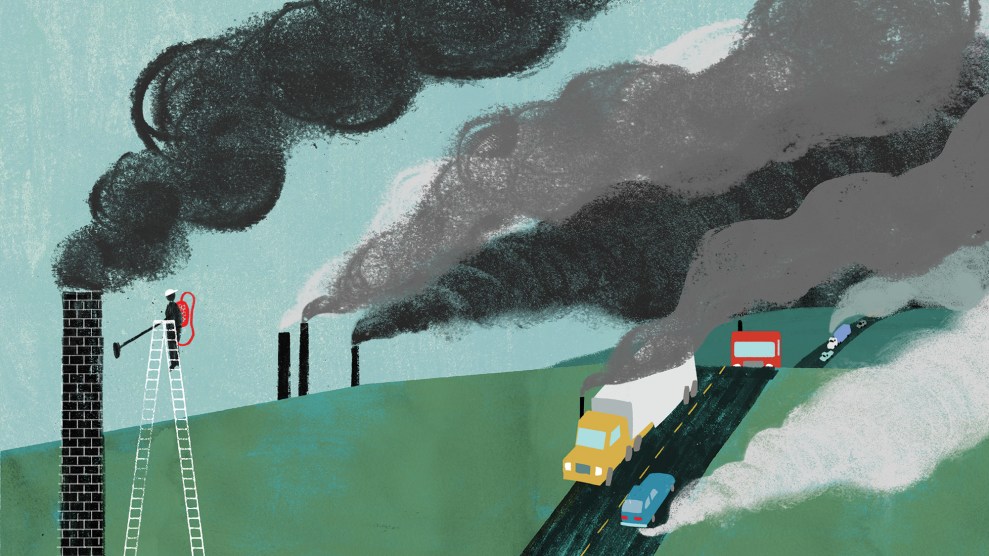
ArtHouse Studio/Pexels
This story was originally published by Grist and is reproduced here as part of the Climate Desk collaboration.
To say that 2023 is one for the record books is a vast understatement—the year was so out of the norm that you’re forced to go back at least 125,000 years for a point of reference. The last time anyone experienced a year as warm as this one, mastodons and giant sloths roamed across North America during the beginning of the late Pleistocene. Suffice it to say, there weren’t many people around to experience it.
In 2023, it felt like Earth might run out of records to break. For a stretch in early July, the planet snapped its all-time daily heat record four times, one day after another. It added up to the hottest week ever recorded in what became the hottest summer ever recorded. Then, September broke its previous monthly heat record by half a degree Celsius—a margin so stunning that Zeke Hausfather, a climate scientist, declared it “absolutely gobsmackingly bananas.”
Hausfather’s attention-grabbing phrase showed up in the headlines of The Guardian, Wired, and Bloomberg, adding pizzazz to what might have otherwise felt like yet another story about another broken record. As the world overheats, everyone from scientists to TikTok influencers is reaching for a fresh vocabulary to put words to what’s happening, coining new terms and assigning old ones new meanings. It’s a sign that language is catching up to the history-making environmental changes happening around us.
For North America, it was a year of fire and smoke. Canada burned from coast to coast, with 6,500 fires scorching so much land that the 45.7 million acres burned surpassed the previous record by more than 2.5 times. The fires sent a thick haze into cities in the eastern half of the United States that were unprepared for smoke, from Chicago to New York, making June 7 the all-time worst day of pollution from wildfire smoke for the average American. The country’s deadliest fire in a century ripped through Lahaina on the island of Maui in August, killing 100 people.
Elsewhere in the world, heavy rains forced nearly 700,000 people to flee their homes in Somalia after years of drought; Hurricane Otis, a storm that rapidly escalated into a Category 5, slammed into Mexico, destroying the homes of roughly 580,000 people; and an avalanche triggered an outburst from a melting glacial lake in the Himalayas in northeast India, sending a deadly wall of water barreling down the mountain valleys into towns below.
Every December, dictionary editors sift through the lexicon and pick a word that best reflects the spirit of the waning year. Their selections this time around suggested a modern-day preoccupation with what’s genuine. Merriam-Webster chose “authentic,” the Scotland-based Collins Dictionary went with “AI,” and the publishers of the Oxford English Dictionary picked “rizz,” slang for charm or romantic appeal. Some of the top contenders hinted at a changing environment, such as “heat dome” and “dystopian.”
When putting together our annual list of the most notable words in the climate conversation this year, we had plenty of great options. “Global boiling” stood out in such an overheated year, and “El Niño” seemed like an obvious pick, too. We whittled the candidates down to the following 10 that we thought best captured what it felt like to live through a particularly smoky, sweltering year. Though these words and phrases aren’t all newborns, they’re all very 2023.
AQI
The Air Quality Index, a color-coded measure of how dangerous the air is to breathe.
The AQI used to be something only air quality nerds cared about, until folks coughing through smoke-filled summers in the West over the past decade began checking the index every morning before heading out for the day. In 2023, wildfires in Canada sent dangerous air to places in the United States that had never seen anything like it in living memory, and the AQI entered the rest of the country’s vocabulary. Google searches for AQI spiked along the East Coast and in the Midwest as people scrambled to understand the new threat. Inhaling the fine particles in wildfire smoke has been linked to long-term effects like heart attacks, lung cancer, and dementia. Public officials in New York City were slow to warn the public and distribute N95 masks, even though the AQI reached 484 in parts of Brooklyn, off the charts of the rating system. Anything over 300, colored maroon on the AQI chart, is considered “hazardous,” even for healthy adults.
Carbon insetting
Business-speak for companies reducing emissions in their own supply chains; an alternative to carbon offsetting.
For years, companies have been making pledges to go “carbon-neutral,” aiming to offset their emissions with tree-planting projects, usually halfway around the world. But offsetting schemes often fail to deliver on what they promise. An investigation by The Guardian in January found that most carbon offsets from rainforest projects are “phantom credits,” with 94 percent of those approved by the world’s biggest certifier, Verra, offering “no benefit to the climate.” Enter carbon insetting, in which companies attempt to remove emissions from within their own supply chains — the string of activities involved in producing and distributing their products. The practice originated in the early 2000s with companies that rely heavily on agriculture, and it’s now being adopted by Nestlé, PepsiCo, and Apple. Still, experts say that without strong standards, insets will have the same problems as offsets. Offsetting, insetting, and whatever-setting are no substitute for just emitting less carbon in the first place.
Climate quitters
People who resign from their jobs over concerns about climate change.
In January, Bloomberg identified a new trend in the workplace: leaving your old job to work on climate change full-time. So-called “climate quitters” included a former public affairs employee for ExxonMobil who now works for a cleantech communications firm and a restaurant reviewer who started a company to plant tiny native forests in cities. It could be a sign of growing discontent at the lack of large-scale climate action. A survey of 4,000 employees in the United States and the United Kingdom this year found that more than 60 percent of employees wanted to see their company take a stronger stance on the environment, and half said they would consider resigning if their companies’ values didn’t align with their own. But does it have any effect besides feeling better about yourself? Publicly quitting can create a PR nightmare for companies, Alexis Normand, the CEO and co-founder of the carbon accounting platform Greenly, told the BBC: “It’s an extremely powerful form of lobbying.” Of course, staying at your current not-very-environmentally-friendly job and advocating for sustainability can make a big difference, too.
Deinfluencers
Social media influencers who (supposedly) want to convince you not to buy things.
TikTok and Instagram aren’t just for entertainment—they’ve become an advertising ecosystem encouraging reckless consumption. Last year, influencers sold more than $3.6 billion worth of products on the online shopping platform LTK alone, and a study from Meta found that 54 percent of Instagram users surveyed made a purchase after seeing a product on the platform. Manufacturing, shipping, and, eventually, disposing of all that stuff when the next trend takes over has created a huge environmental problem, with discarded clothing piling up in Chile’s Atacama Desert and filling the ocean with microfibers. So-called deinfluencers are pushing back against this out-of-control consumerism, targeting fast fashion and pointless crap that has gone viral. “Do not get the Ugg Minis. Do not get the Dyson Airwrap. Do not get the Charlotte Tilbury wand. Do not get the Stanley cup. Do not get Colleen Hoover books. Do not get the AirPods Max,” TikToker @sadgrlswag said in a video in January. By December, videos with the hashtag #deinfluencing had racked up more than 1 billion views. The trend is already at risk of morphing from discouraging overconsumption to simply recommending one product over another — using the mantle of green credentials to sell more stuff and look environmentally friendly while doing it.
El Niño
A global weather pattern characterized by warmer-than-average temperatures.
One reason 2023 was so hot (apart from climate change)? The arrival of a strong El Niño, which the planet hadn’t seen since 2016, the previous record-holder for hottest year. It replaced La Niña, a cooler pattern that had tempered the heat of the last three years. El Niño brought 101-degree, hot-tub temperatures to the ocean off Florida, steaming coral reefs and fish, anemones, and jellyfish in the Everglades. The weather pattern also tends to fuel the spread of diseases carried by mosquitoes, like malaria and dengue, and other pests that thrive in warmer weather. Thanks to El Niño and climate change, it’s easy to make one reliable prediction for 2024: Global temperatures are likely to be even hotter. The World Meteorological Organization predicted in May that the next five years are sure to be the hottest ones yet.
Global boiling
It’s like global warming, but way more worrying.
António Guterres, the United Nations Secretary-General, is the Shakespeare of scary climate phrases. In past years, his fiery speeches have brought us “code red for humanity” and dire metaphors such as “We are digging our own graves.” In a year as hot as 2023, Guterres managed to up the ante again. Not only did he warn that humanity had “opened the gates of hell,” but he also declared that Earth had entered the “era of global boiling” in July, the hottest month in at least 125,000 years. The phrase “global warming” has been criticized for sounding too nice — after all, everyone loves summer! The same can’t be said for global boiling, which sounds like it’s going to turn us all into soup.
Greenhushing
When companies go quiet on their environmental commitments.
A few short years ago, even oil companies were assuring everyone that they’d slash their emissions. But things started changing this year. Amazon, which famously named its Seattle sports and concert venue “Climate Pledge Arena,” quietly abandoned one of its key goals around shipping emissions, and oil majors scaled back their climate commitments. The trend of greenhushing has emerged as governments from California to the European Union are crafting regulations to counter false advertising around sustainability (often called “greenwashing”). Given that corporations such as Delta are getting taken to court over deceptive environmental marketing, many executives figure that silence is the safer option. Nearly a quarter of companies around the world are choosing not to publicize their milestones on climate action, according to a report from South Pole, a Switzerland-based climate consultancy that popularized the term greenhushing. While the practice makes it harder to scrutinize what companies are doing, some say greenhushing could be a good thing — after all, it’s stopping misleading advertisements.
Noctalgia
The feeling of missing a dark night sky.
Ever since humans started looking up, they’d see the starry arc of the Milky Way on a clear night. Nowadays, thanks to light pollution from cities, satellites, and even oil and gas production, our galaxy is becoming a rare sight. Artificial light messes with our sleep and confuses wildlife, and the absence of true darkness is also a loss for culture and science. In August, the astronomers Aparna Venkatesan from the University of San Francisco and John C. Barentine from Dark Sky Consulting came up with a new term to express the loss of dark night skies: noctalgia, or “sky grief.” It’s a play on “nostalgia” that uses the Latin prefix noct-, meaning night. “This represents far more than mere loss of environment: We are witnessing loss of heritage, place-based language, identity, storytelling, millennia-old sky traditions, and our ability to conduct traditional practices,” the duo wrote in a comment to the journal Science.
RICO
The Racketeer Influenced and Corrupt Organizations Act, a law made for the Mafia and organized crime—now being applied to oil companies.
Eight years ago, investigations found that “Exxon Knew” about the dangers of burning fossil fuels in the 1970s, but worked to undermine the public’s understanding of climate science, sowing “uncertainty” about its effects. Since then, lawsuits against oil, gas, and coal companies have proliferated, most of them arguing that companies violated laws that protect people from deceptive advertising. But a new kind of climate lawsuit has emerged that uses a relic from the past: a federal RICO law passed in 1970 to take down organized crime. In November 2022, 16 towns in Puerto Rico accused Chevron, ExxonMobil, Shell, and other fossil fuel companies of violating the federal RICO law by colluding to conceal how their products contribute to climate change. Six months later, Hoboken, New Jersey, amended its complaint against Exxon and other companies to allege that they violated the state’s RICO law. Racketeering lawsuits have been successful against tobacco companies and pharmaceutical executives tied to the opioid epidemic. Former President Donald Trump and his allies were also hit with a RICO case in Georgia this year, accused of conspiring to change the outcome of the 2020 presidential election.
White hydrogen
Naturally occurring hydrogen found underground.
Hydrogen is a carbon-free fuel that could replace fossil fuels in a range of hard-to-decarbonize industries, from aviation to steelmaking. The problem is that the most abundant element in the universe isn’t normally found on its own, and turning it into a fuel to fly airplanes, for instance, takes lots of energy. There’s a whole rainbow of hydrogens out there, distinguished by how they’re made—expensive “green hydrogen” from renewables, “gray hydrogen” from methane gas, and “brown hydrogen” from coal. Then there’s white hydrogen, which isn’t made from anything at all. Scientists used to think that there weren’t big reserves of hydrogen buried underground, just waiting to be collected, but in recent years, they’ve been discovering more and more. Recently, some scientists looking for oil and gas reserves in France stumbled upon what could be one of the largest reservoirs of white hydrogen to date, containing somewhere within the stunningly wide range of 6 and 250 million metric tons. Untapped reserves in the United States, Australia, Mali, Oman, and parts of Europe could provide clean energy on a large scale — if all goes according to plan. Startups like Gold Hydrogen, based in Australia, and Koloma, based in Denver, are in the early stages of drilling for hydrogen and could be headed to production
















